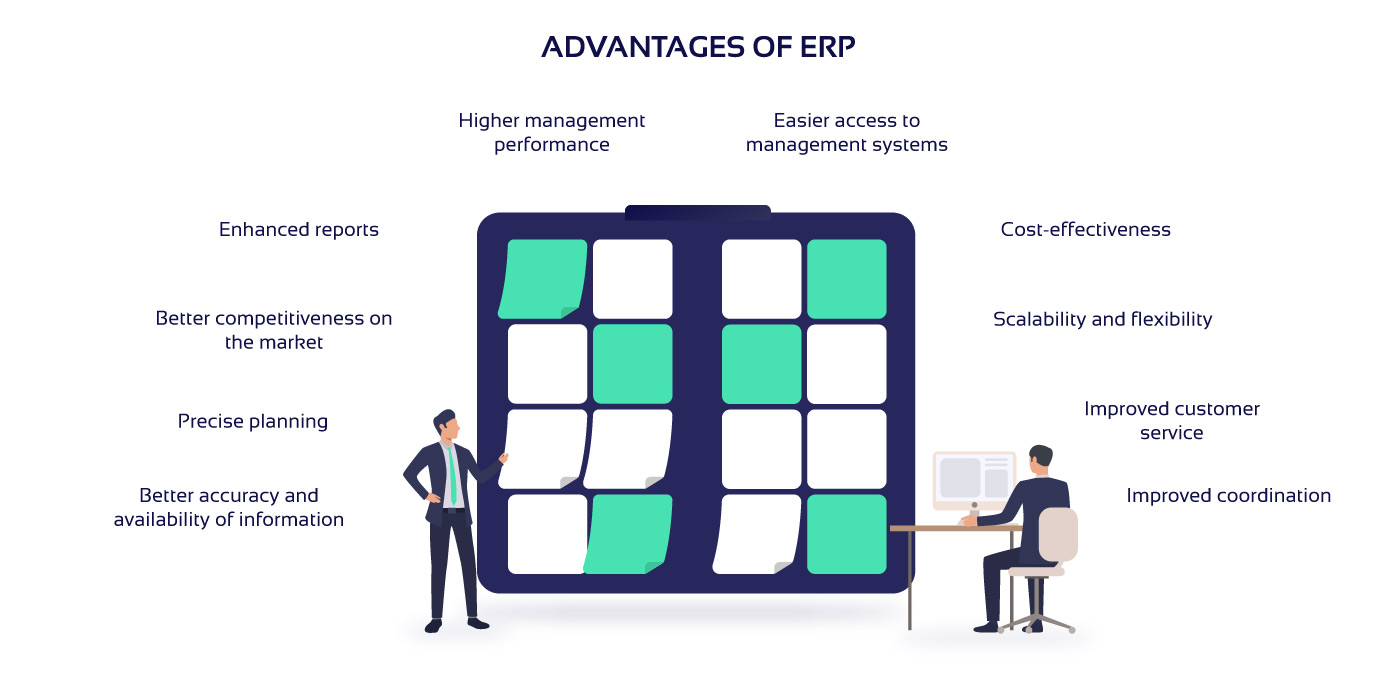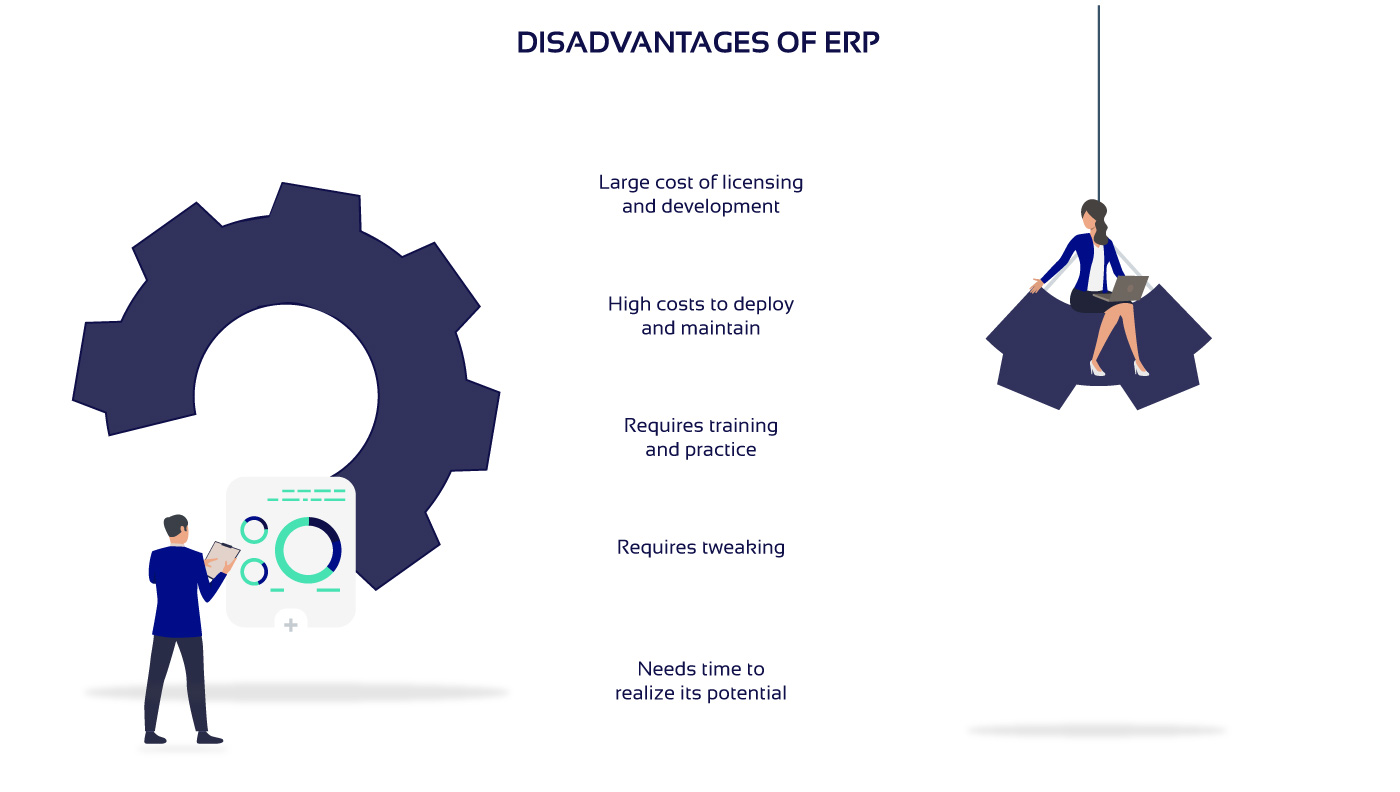10 Benefits of ERP | Advantages and Disadvantages of ERP System
Running an effective enterprise requires experience, skills, and business acumen, but most of all – wise management of business processes,
and use of advantages of enterprise resource planning. The competitive nature of modern markets forces entrepreneurs to seize every available opportunity, including technological advances, to maximize efficiency and stay ahead of the rivals.
ERP systems have long since established their dominance in the field of software solutions for business. This article will summarize the reason for this phenomenon by detailing the ERP benefits as well as answering the reasonable question “what are the disadvantages of erp?”
Advantages of ERP
It was already mentioned that enterprise resource planning software offers multiple powerful opportunities that may be turned into profitable perks by a skillful person. So, let’s cut to the chase and review the potential benefits of enterprise systems.
1. Higher management performance
ERP solutions serve as a data center that establishes links between all aspects of enterprise activities that require management, including human resources, production, sales, customer support, inventory, and supply. With the help of computer technologies, ERP software enables automatic data handling in the fastest and most effective way.
As a primary advantage, enterprise resource planning solutions greatly reduce the paperwork and the need for manual data input. This benefit results in a significantly smaller chance of human errors that can disrupt the production flow. In addition, there is no need to convert data stored on paper into a digital format, which allows to direct respective human resources elsewhere.
2. Better accuracy and availability of information
This is the core perk that, one way or another, influences on all the rest of enterprise resource planning advantages presented in this list. Advanced ERP systems enable effective and centralized collection, processing, and storage of information on production, sales, supplies or customers, for example. Thus, a single data system is used and maintained instead of a number of separate databases that need regular checks and synchronization to remove obsolete or duplicate records.
The increased quality of all kinds of internal data, combined with its easy availability to the staff in any relevant department, is an invaluable feat that leads to further performance optimization on all levels of the enterprise. Particularly, supply chain and inventory management is the activity that benefits the most from ERP implementation.
3. Improved coordination
The unified system that contains all business-related data improves cooperation between enterprise branches or departments. ERP software reduces the communication delays across the whole company, enhancing its efficiency. This is especially beneficial if a company has a distributed network of affiliates in several states or even on different continents.
4. Precise planning
The convenient access to the bulk of business information greatly facilitates its analysis in order to plan a further development course. The company’s management staff and business analysts can use the aggregated data more effectively to devise new strategies or suggest improvements to the existing one.
5. Enhanced reports
As a result of reduced paperwork and improved communication among departments, ERP software offers the convenient environment for quick and easy submitting all kinds of reports: from financial to inventory, from customer behavior to technical maintenance, etc.
6. Scalability and flexibility
Another inherent benefit of ERP software is determined by its modular structure that allows adjusting its scale according to current needs and conditions. Thanks to this feature, a resource planning system easily adapts to expansion or reduction of the company on every level.
Even the most trivial changes in the company structure and operation, such as the appearance of new products, workers, production facilities, suppliers, departments, etc. demand high flexibility of ERP solutions. Whether the growth involves production increase, inventory extension, addition of new functions, services or users, ERP systems can handle all these changes and much more.
7. Cost-effectiveness
As a result of reduced paperwork and optimization of daily routines, most of all – decrease of repetitive tasks, ERP systems allow cutting costs on administrative needs. Besides, resource planning solutions greatly speed up business operations that involve various information requests and approvals, such as logistics, stock and supply management, and others.
8. Easier access to management systems
According to specific needs in the context of resource planning, ERP systems may be implemented as web or mobile applications enhanced with cloud technologies. This way, they can run on smartphones, laptops, or other portable devices and can be accessed anytime and from almost any location.
9. Improved
customer service
Another practical benefit of modern ERP software is the optimization of customer relationship management. A centralized data storage accumulates all necessary information on sales and clientele, which makes it easier for sale managers and customer support staff to communicate with clients and reduces the delay before reacting to customers’ requests.
Faster access to customer histories with enhanced accuracy also adds to other benefits listed here. For example, accurately collected and analyzed data on customer behavior patterns may lead to strategy optimizations, or more precise predictions of demand that must be satisfied accordingly and in proper time.
10. Better competitiveness on the market
This last benefit is in fact the summary of all the aforementioned advantages relayed in the perspective of business profits. The point is that ERP systems give the most needed competitive advantage to the enterprise, an extra device to outperform the rivals. While some companies stick to time-proven methods or simply cannot afford ERP solutions, others enhance their businesses with technological advances and reap the profits.
Disadvantages of ERP
The benefits of ERP solutions are undeniable; yet, there are several drawbacks that must be examined before trying to implement such enterprise resource planning systems in a particular business company. If a business owner fails to overcome and negate these disadvantages, an ERP solution would lack efficiency or even would be unfeasible or meaningless.

1. Large cost of licensing and development
ERP solutions are very complex, and their development is a difficult and accordingly pricy process. Building a resource planning system according to customer’s specifications requires an experienced and numerous team with a high level of expertise. High skills demand high wages per hour, so the resulting price of a custom-made solution may be quite hefty.
Ready-made ERP systems are faster options, though the licensing costs are also rather steep. The lower prices of ready solutions also involve worse flexibility, longer customization periods, possible maintenance and security risks, or even incompatibility with the company processes and business needs.
2. High costs to deploy and maintain
If you think that the prices of ERP systems are too high, there are some bad news for you. The implementation and maintenance of such solutions involve even larger expenditures and require hiring additional tech staff. As for ready-made solutions, they need regular updates that may involve additional expenses. However, remember that these investments will eventually pay off thanks to improved efficiency of the whole enterprise.
3. Requires training and practice
The complexity of ERP software brings additional requirements to the staff who use it. Learning at least the basics of a resource planning system may take considerable time and effort, and requires significantly more to master all its functionality.
Another related drawback is that when experienced users of an ERP system leave the company, the newcomers who fill their positions must spend a varied amount of time to learn it from scratch instead of starting work right away. However, you may facilitate the learning process by providing a sufficient amount of manuals and training programs beforehand.
4. Requires tweaking
Successful implementation of ERP software requires thorough and precise adjustment, from extensive customization to fine-tuning. Both ready-to-use solutions and custom-made systems need to be adjusted to the structure of a particular enterprise on all levels of management.
5. It takes time to realize its full potential
As you can see from the previous drawbacks, EPR systems require quite some time to be used with maximum effectiveness. In addition to the lengthy development process, there are stages of deployment, system customization, initial data input, staff training and getting accustomed, each involving a certain delay.
Outcome
As you can see from the article and accompanying infographics, ERP systems are not all-purpose solutions that guarantee 100% success. Instead, they have a number of advantages and disadvantages that must be taken into account while considering the necessity and profitability of employing such systems.
Though there are various commercially available and custom-made
enterprise resource planning systems, benefits
associated with them remain roughly the same. In summary, they save time and financial resources, enhance productivity and customer satisfaction, optimize business processes, centralize all data flows, and enable easy scalability. If you like to introduce these benefits to your business, Light IT will gladly help you with this task.
















![Toni Kroos là ai? [ sự thật về tiểu sử đầy đủ Toni Kroos ]](https://evbn.org/wp-content/uploads/New-Project-6635-1671934592.jpg)


